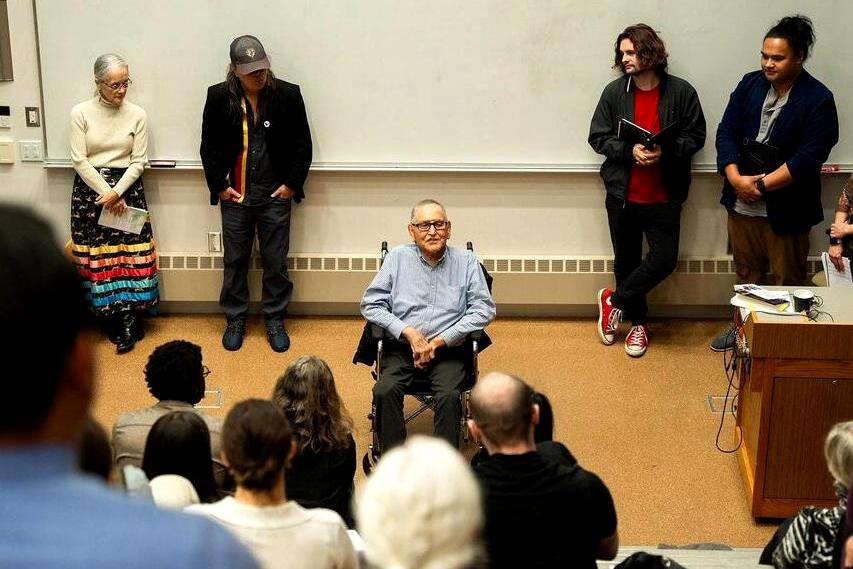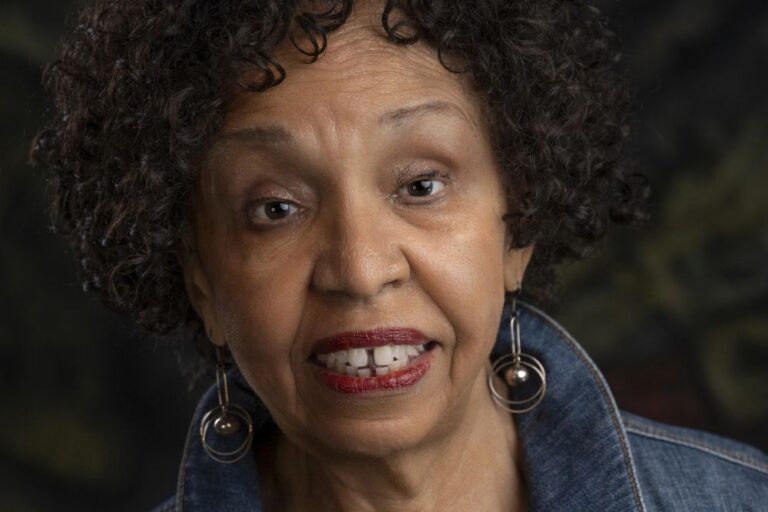Gordon Henry, Professor in the Department of English and the inaugural Audrey and John Leslie Endowed Chair in North American Indian and Indigenous Literary Studies, will retire from Michigan State University on December 31, 2023, after more than 29 years of service to the university and community.
His work and the impact he has made was celebrated during an event held at MSU earlier this month, where friends, family, faculty, staff, and students gathered. The event was not only a celebration of Henry’s legacy, but also a celebration of North American Indigenous literature and song.

Henry is Anishinaabe and an enrolled member of the White Earth Chippewa Tribe of Minnesota. He has dedicated his writing, scholarship, and life to Indigenous tribal communities and plans to continue that work in his retirement.
“I will be affiliated with MSU as an emeritus faculty and through future work with tribal communities in Michigan and beyond,” Henry said. “I will also take on additional positions in American Indian and Indigenous Studies programs at other universities in the United States and Europe.”
Internationally recognized for his writing and poetry, Henry’s creative work focuses on American Indian survival, adaptability, and the breadth and depth of American Indian storied intellectual resilience, offering readers different Indigenous ways of relating to American history.
“I will be affiliated with MSU as an emeritus faculty and through future work with tribal communities in Michigan and beyond. I will also take on additional positions in American Indian and Indigenous Studies programs at other universities in the United States and Europe.”
Gordon Henry, Professor
Henry’s poetry, fiction, and essays have been and continue to be taught in American Indian literature courses throughout the United States and can be found in various collections of American Indian literature in the United States and Europe. His book, The Light People (1994), which consists of a series of stories about a tribal community in Northern Minnesota, received the American Book Award in 1995.
Henry began his MSU career in Fall 1994. During his time at Michigan State University, he served as Director of the Native American Institute for three years, working with tribal communities and university partners on sustainability issues, Indigenous food sovereignty, early childhood education programs, and a youth suicide prevention film project. He also aided in the development of the Saginaw Chippewa Tribal College on the Isabella Reservation in Mount Pleasant, Michigan.
Along with George Cornell, Emeritus Professor of English, and Patrick Lebeau, Professor of Writing, Rhetoric, and American Cultures, Henry drafted the original program documents and was granted approval and funding for the establishment of the American Indian Studies Program at MSU.

Henry also founded Indigistory, a community-based digital storytelling project dedicated to tribal communities. For his work with Indigistory, he received the Distinguished Partnership Award for Community-Engaged Creative Activity from MSU in 2018.
Henry served as Director of Creative Writing in the American Indian and Indigenous Studies Program and Senior Editor of the American Indian Studies book series published by the MSU Press.
He worked on The Andrew W. Mellon Foundation grant received by the College of Arts & Letters that is dedicated to the development of community and academic programs, curriculum, and resources for teaching Anishinaabemowin and other less commonly taught languages. He also served as a co-PI, in partnership with the Saginaw Chippewa Tribe’s Ziibiwing Center, on a strategic planning grant for creating a digital archive of Anishinaabe literature, language, and storytelling.

“Dr. Henry’s career at MSU has been extraordinary in every way. A celebrated novelist, essayist, and poet, Dr. Henry also has a distinguished record of intellectual leadership within the fields of North American Indian literary studies. His work demonstrates a career-long commitment to faculty collaboration and leadership in program building, interdisciplinary innovation, and community outreach, especially to American Indian communities and tribal organizations,” said Justus Nieland, Chair of the Department of English. “The Department of English is deeply grateful for Dr. Henry’s longstanding commitment to the teaching of a diverse range of Native literatures, his inspiring record of outreach to Native communities, and his support and mentorship of faculty and students of color within the department. Dr. Henry will be greatly missed in the department and college!”
During the event to honor Henry, which was held at Wells Hall on Nov. 9, he read from his story, The Silver Saxophone, Masks of Pain and the People in the Hills. The event also included a traditional blanketing ceremony to recognize and highlight Henry’s contributions to the university. The blanketing ceremony was led by MSU representatives Emily Sorroche, Associate Director of the College of Agriculture and Natural Resources Office of Diversity, Equity, and Inclusion; Kevin Leonard, interim Director of the Native American Institute in the Office of University Outreach and Engagement; and Kristin Arola, Gillmor Endowed Professor in Professional and Public Writing and interim Chair of American Indian and Indigenous Studies.
“Dr. Henry’s career at MSU has been extraordinary in every way…His work demonstrates a career-long commitment to faculty collaboration and leadership in program building, interdisciplinary innovation, and community outreach, especially to American Indian communities and tribal organizations.”
Justus Nieland, Chair of the Department of English
Also included in the event was a prayer song by Glenn Wasicuna, Dakota Language Instructor at Sisseton Wahpeton College and Minnesota State University; a song by LeAnne Howe, Eidson Distinguished Professor of American Literature at the University of Georgia, who also read from her forthcoming novel, 1918 Union Valley Road; a reading from Gwen Westerman, visual artist and Professor of English Literature at Minnesota State University, who read from her recent poem collection, Blood Deep, which draws from her grandmother’s untold stories; and music by MSU graduate student Taylor Elyse Mills and a College of Music quartet.
“Gordon is a well-respected community member, and his legacy and impact will continue to shape future generations of Spartans,” Leonard said. “It was a great honor and fitting ceremony to recognize him during Native American Heritage Month.”
November is National Native American Heritage Month, a time to celebrate the rich and diverse cultures, traditions, and histories while acknowledging the important contributions of Indigenous peoples.


